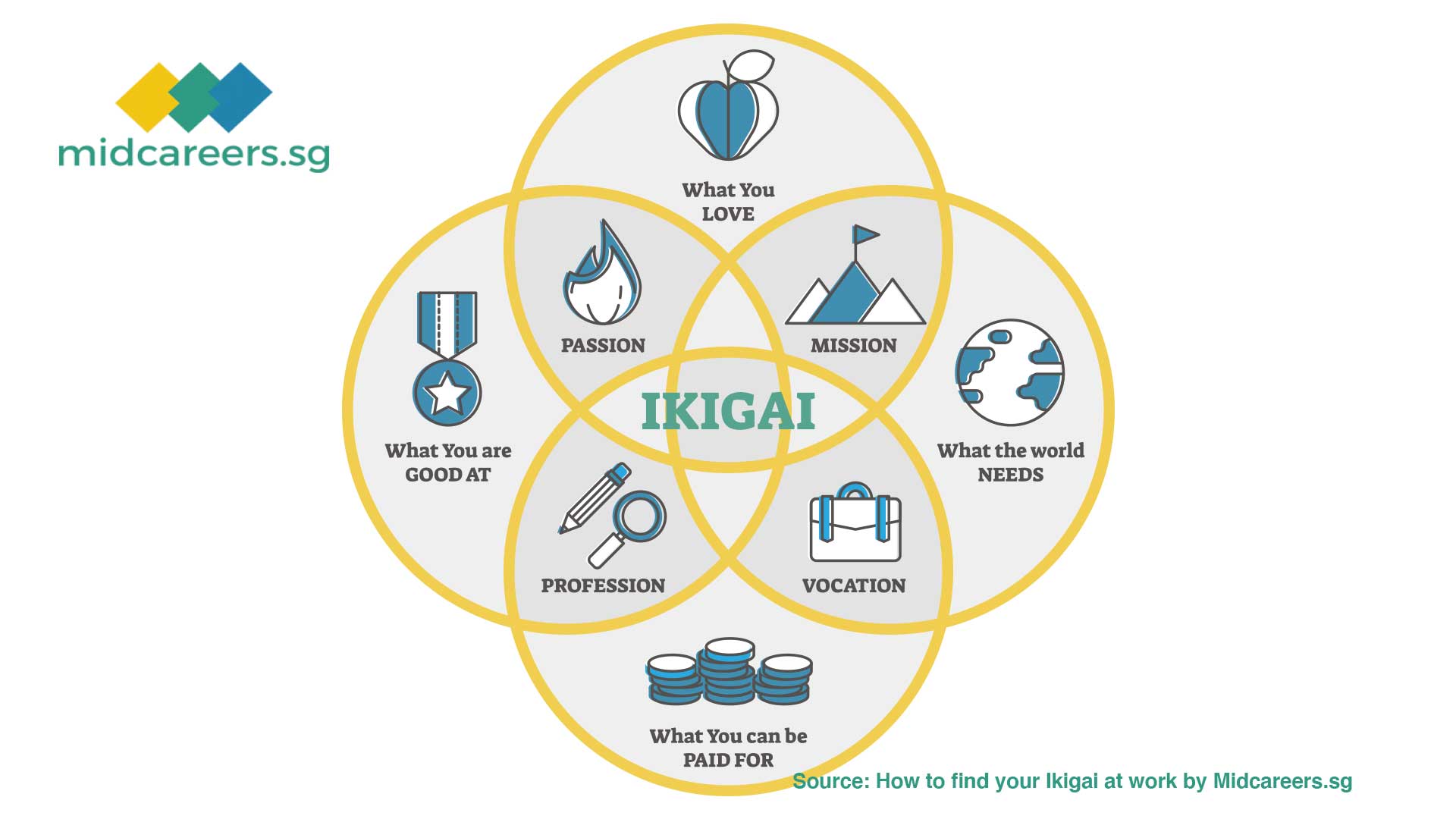
How to find your Ikigai at work
Two people working in the same place, on the same day, can take away two entirely different experiences. Consider, for instance, restaurant workers who meet an angry customer.
After being shouted at, what’s their likely reaction?
An expected reaction might be the staff getting irritable or upset. And yet, if you’ve been to your share of restaurants, you may have noticed there are some good workers who don’t get upset at all. In fact, some take it as a challenge to make angry customers happy; and even seem to get satisfaction from being the one to calm a rude or obnoxious customer.
This begs the question why.
The two workers may have the same amount of pay, the same amount of experience, and the same long hours – but one seems to be energised by the job, whereas the other feels drained.
This is the concept of Ikigai, a career concept forged in the highly disciplined work environment of Japan. It explains how the Japanese – who are among the world’s hardest workers – are able to cope.
By discovering it for yourself, Ikigai makes you happier and more productive; once again inspiring you to do your job. When you’re not dragging your feet to work, your performance also benefits; and it may be the element that takes you forward.

What is Ikigai?
In broad terms, Ikigai is a form of centeredness. Its meaning in Japanese translates roughly to “a reason for being”. This isn’t a new buzzword or fad; it’s was understood all the way back in the Heian Period, between eight and 12th century Japan.
Ikigai is most obvious among people who do high-demand jobs, for which financial compensation is not the sole reason. Many social and charity workers, for example, could never be paid enough for the sheer number of hours they have to put in; and probably no fireman is ever paid enough, to risk his life rescuing someone from a burning building.
You may find, however, that these people are happier than the average office worker with the Monday blues – even if their job is several times tougher and less rewarding.

That’s because they’ve found their Ikigai, a job that meets four main criteria:
- Doing what you’re good at
- Doing what you love
- Doing something that the world needs
- Doing something that they can get paid for*
*This is not necessarily a huge sum, but enough that they can live with reasonable security
The more of the above categories your job can meet, the closer you are to finding Ikigai.
For example: a job that only meets one requirement (you can get paid for it) can get dreary fast – you can end up hating every day of work, but going just because you need the money. It’s a depressing way to live.
A job that you’re good at, and that you love, is a labour of passion. Unfortunately, not all passions pay as well. If you can’t make enough money to survive, then you’ll feel guilty for shirking responsibilities (e.g., your spouse needs to support you because you don’t earn enough).
You may not be able to find your Ikigai right away from day one. The truth is, most people don’t manage to find their ideal job right out of school; but that’s alright. The key is to move forward, and to keep hunting for the job that will match your “reason for being” – whether you’re just out of school, or changing careers midway.
How to find your Ikigai
Here are practical steps you can take right away:
Step 1: Reflect on where your current job does, or does not, meet each category for Ikigai

It’s best to do this by writing or typing, rather than just thinking about it. Ask yourself how your job fulfils the needs of: what you’re good at, what you love, what the world needs, and what you can be paid for doing it.
When doing this exercise, it’s important to be honest: this means leaving some of the needs blank, if your job doesn’t fulfil them. If you truly loathe your job, for instance, then write nothing under “what you love”.
Based on the number of criteria you fulfill; you can get a sense of how close you are to finding your Ikigai.
Step 2: Devote some time every day, to improving your craft

We’ll let you in on a secret: what you love, and what you’re good at, are interrelated. Most (but not all) of the time, people learn to love something more as they get better at it.
When you’re new to something and bad at it, the learning process can be frustrating. In a job, you may feel flustered all the time. But as you slowly learn more about your craft, and become an expert, a passion for it tends to follow.
So don’t be too quick to dismiss something as what you “don’t love”, especially if it’s new to you. It may just be out of your comfort zone right now. Always make an effort to get better at it, and then see if the passion follows.
If, after numerous tries, you’re still not getting more interested (or you do get good but still find it boring), then it’s time to move on.
Step 3: Look for signs or affirmation about how your job benefits others

Don’t just focus on performance reports, or quarterly reports. Go on the internet, and see what others are saying about your company or work. Speak to clients, and ask them how your work has helped them. You can even ask colleagues or family members about whether your work has helped them.
Keep a portfolio (or a file of saved links), where the effects of your work are described. Every month or quarter, review these: are the effects of your work something you’re proud of? If you were gone tomorrow, would you be satisfied with the way you’ve changed the world?
As with other aspects of finding your Ikigai, you must give this some time. It’s not possible to know the effects of your work after just a few weeks on the job. But if you’ve been in the same job for a few years, and you’re still not happy with impact you’re having, then it may be time to move on.
Step 4: Make an honest review of your financial health

As a loose rule of thumb, your expenses should not exceed 50 per cent of your monthly earnings. If it does, you may need to find a more lucrative job – even if you happen to love your current one.
We know that’s painful, but look at this way: if you earn enough, you have the means to pursue other passions too!
This isn’t a universal rule of course; and different people need different amounts for their financial security (e.g., parents probably need more, if they also have children to look after). But the “correct amount” is one where you’re not consumed by anxiety all the time, or buried under debt.
The danger of pursuing a job you love, when it doesn’t pay enough to maintain you, is that over time you may come to loathe the job instead. It will become associated with suffering more than satisfaction.
Step 5: Be willing to make changes

Finding your Ikigai doesn’t always necessitate changing your job. In some cases, you may be able to find it by modifying aspects of your job.
For example, you may have a job that makes enough money, serves a purpose to the world, and which you’re good at: but you don’t love it, because its long hours or rigid nature interfere with family time.
You might try asking your boss if you could attempt a Work From Home arrangement, or to implement flexible hours.
However, there will be times when elements of your work can’t be changed. If you feel your employer is too profit-driven and doesn’t serve the world, for instance, you may not be in a position to change it.
In these cases, you must be willing to move on, and explore other options to find your Ikigai. At Midcareers.sg, we understand it can be challenging – but necessary – to move back onto the right career path; even if you’re making a change later in life. Do reach out to us, so we can help you find your Ikigai and kick start your career switch today.
Career Fit Tool
Complete the Enneagram test and receive your personalised report @S$20 from our veterans.

